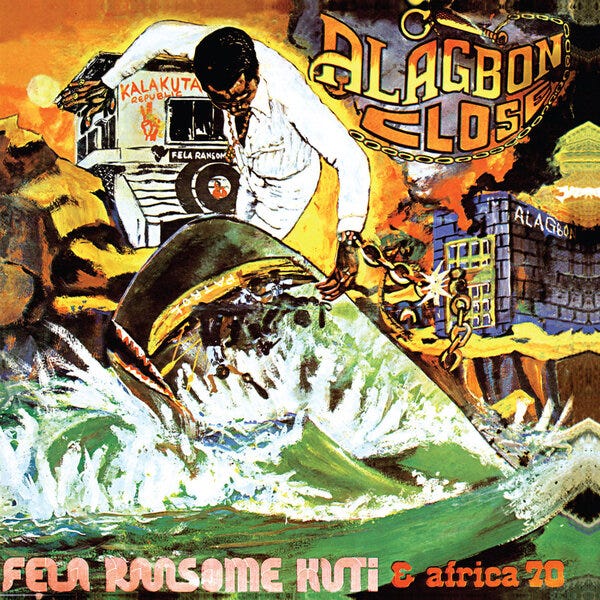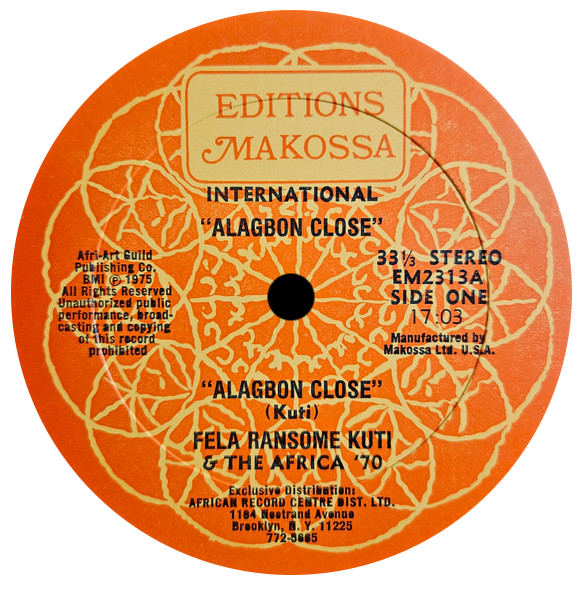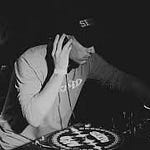Alagbon Close, released in 1974 in Nigeria by Jofabro (catalog no. JILP 1002) and in 1975 in the United States by Makossa Records (catalog no. EM23.13), is a seminal album by Fela Ransome Kuti and his band Africa 70. Recorded at Ginger Baker’s ARC Studio in Lagos, it is considered a landmark in the development of Afrobeat, with historian Chris May noting it as the first album to fully bring together the genre’s elements. The album is a politically charged work, reflecting Fela’s growing confrontation with Nigerian authorities, particularly the police, and is notable for its bold lyrical content and musical innovation.
Recording and Release: Recorded in 1974 at ARC Studio, Lagos, with engineer Emmanuel A. Odenusi. Released in Nigeria in 1974 and in the U.S. in 1975, marking Fela’s first official American release with Africa 70.
Sleeve Design: The album was the first to feature artwork by Ghariokwu Lemi, whose designs became integral to Fela’s Afrobeat aesthetic, visually amplifying the album’s anti-establishment message.
Inspiration: The title track was inspired by two police raids on Fela’s Lagos home in April and May 1974. The first raid, searching for marijuana, was unsuccessful. In the second, police attempted to plant a joint on Fela, which he swallowed. He was detained for three days at Alagbon Close, the Nigerian Criminal Investigation Department headquarters, where inmates jokingly called their cell the “Kalakuta Republic.” A “feces switch” by fellow prisoners led to his release, and Fela later named his commune Kalakuta Republic after this experience.
Tracklist:
Alagbon Close (17:06): A scathing critique of police brutality and corruption, focusing on the Nigerian police’s harsh tactics, favoritism toward the wealthy, and disregard for human rights. Fela sings, “Nothing special about uniform / Uniform na cloth na tailor dey sew am like my dress,” emphasizing that police authority is not above the law. The track features a heavy keyboard, hypnotic rhythms, and fiery horn sections led by Fela’s tenor and alto saxophone.
I No Get Eye for Back (7:58): A more melodic, instrumentally focused track with catchy hooks, derived from a lyric in the title track. It addresses societal issues in Nigeria, with Fela singing in both pidgin English and Yoruba. Reviewers praise its powerful composition, though some note the keyboard can feel intrusive.
Alagbon Close exemplifies Afrobeat’s blend of funk, jazz, highlife, and African percussive patterns. The album features Tony Allen’s tight polyrhythmic drumming, interlocking guitar riffs, and prominent horn sections, with Fela on tenor saxophone, alto saxophone, electric piano, and vocals. The tracks are extended, groove-heavy compositions, characteristic of Fela’s refusal to conform to short, commercial song formats.
Personnel
Fela Ransome Kuti: Tenor saxophone, alto saxophone, electric piano, vocals, writer, arranger, producer
Tony Allen: Drums, band leader
Lekan Animashaun: Baritone saxophone
Tunde Williams: Trumpet, solo
Henry Koffi: Conga
Tutu Shoronmu: Tenor guitar
Xtopher Uwaifor: Tenor saxophone
Segun Edo: Rhythm guitar
Franco Aboddy: Bass guitar
Ukem Stephen: Trumpet
Daniel Koranteg: Conga
Nicholas Addo-Nettey: Conga
Isaac Olaleye: Maracas
James Abayomi: Sticks
Emmanuel A. Odenusi: Engineer
S. E. Lemy: Cover design
Peter Obe: Photography
https://www.discogs.com/master/150516-Fela-Ransome-Kuti-Africa-70-Alagbon-Close















Share this post